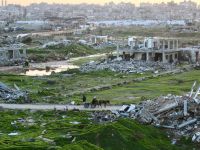Almost half of all terrorist plots against Britain are still hatched in Afghanistan and Pakistan 13 years after British troops were sent to the country to destroy Al Qaeda, David Cameron revealed this morning.
The Prime Minister, in Kabul on an unannounced visit to meet with the country’s new unity government, said Britain had ‘paid a very high price’ for liberating Afghanistan from the Taliban - with 453 British soldiers losing their lives.
Mr Cameron claimed Britain and other allies had forced Al Qaeda out the region and the number of plots originating in the region had fallen. But he admitted the Afghanistan-Pakistan frontier was still a hotbed of terrorism.
He said: ‘When I became Prime Minister I think something like nine out ten plots we faced on the streets of Britain came from the Afghanistan-Pakistan area. That is now well down - somewhere below half, from the latest figures I saw.’
The Prime Minister said British troops will not return to Afghanistan to battle the continuing terror threat because the country's new national army can now look after itself. He said: ‘We are not going to send combat troops back to Afghanistan.’
But former British army officer Dan Jarvis, the Labour MP for Barnsley, raised fears Afghan soldiers could melt away against extremists once British forces leave – just like in Iraq. He said he hoped the Prime Minister was right, but added: ‘We were also told that about the Iraqi army.’
Mr Cameron is the first major Western leader to visit Afghanistan since an election stalemate was resolved, easing threats of armed conflict.
In a speech in a joint press conference he paid tribute to the British soldiers who lost their lives fighting the Taliban and said 'together we have made Afghanistan and Britain safer'.
It came as it emerged that the RAF squadron targeting Isis terrorists in Iraq was actually due to be disbanded in April 2015. It will now be reprieved.
On his way to Afghanistan Cameron visited the frontline RAF Tornado squadron spearheading Britain's air strikes on jihadist fighters in Iraq at its base in Cyprus.
In a surprise visit, David Cameron announced that 102-year old No II Squadron, which had been due to be disbanded in April, would be reprieved.
Two more Tornado GR4 fighter bombers were also being sent to Cyprus as the UK intensified operations against Islamic State targets in Iraq.
With six Tornados flying daily sorties focused on IS fighters and their military hardware, the Prime Minister told air crews and troops at the giant RAF base at Akrotiri in Cyprus: 'We want to make sure that we can keep up this tempo in the days ahead.'
Mr Cameron visited Cyprus as Turkey's parliament approved a motion that gives its government new powers to launch military incursions into Iraq and Syria and to allow foreign forces to use its territory for possible operations against the Islamic State group.
Its parliament voted 298-98 in favour of the motion which sets the legal framework for any Turkish military involvement, and for the potential use of Turkish bases by foreign troops.
Mr Cameron said he had visited Cyprus to hear directly from service men and women about 'their operations, the challenges they face and what support they need.'
He announced the two additional Tornados being sent to the base and confirmed: 'We will also extend the lifetime of Number Two Squadron for a further year to April 2016 to ensure we can sustain this effort in the months ahead.'
But critics of the cuts that have seen RAF fast jet squadrons reduced from 33 at the time of the first Gulf War to seven, said the original decision to axe II Squadron had been 'disgraceful' and the U-turn was a sign of the chaos within Ministry of Defence planning.
The Tornados, which are more than 30 years old, were to have been replaced by state of the art Typhoons but incredibly they cannot match the weapons capability currently of the older plane – a capability needed for what Defence Secretary Michael Fallon has warned could be a three years operation against IS.
Missions over Iraq require the RAF to attack small mobile targets such as trucks and even motorcycles and the Tornado, carrying the Brimstone missile, is suited to this while it will take three years before the Typhoon is fully operational with it.
Air Commodore Andrew Lambert, a former air defence chief who commanded forces in Iraq, said : 'This illustrates the chaos in Ministry of Defence planning.
'The RAF has been squeezed and squeezed and squeezed and now they have found we have reached the bottom of the barrel.' He added : 'If II (AC) Squadron is going to be spared, it makes sense. It would have been utter folly to get rid of the unit at a time when tasking is increasing by leaps and bounds.
'Even though it will have a knock-on effect and create a bit of turmoil, for instance air crews will have already been told their new postings, this is a sensible course of action.
'The Typhoons don't have the capabilities to carry out the same role. To suggest they do is pie-in-the-sky.
Mr Cameron arrived at the Afghan president's palace in Kabul in a motorcade early this morning.
With the UK drawing to the close of its 13-year military involvement in the country, the Prime Minister said that Britain had gone 'a long way' towards achieving its objectives there.
The Prime Minister paid tribute to the UK servicemen and women who have died in the course of operations in the country as well as to those who had been injured.
'They (the armed forces) have paid a very high price for our engagement in Afghanistan. They have done vital work here,' he said.
'We should remember those who paid the ultimate price and those who were injured through the work they did.'
He continued: 'This year again, Afghan forces have proved to the Taliban once again that their aims will not be achieved through violence and intimidation.
'If the Taliban want to secure a role in the future of Afghanistan then they must accept that they have to give up violence and engage in the political process.'
Mr Cameron said the UK would continue to support the Afghan National Officer academy in the capital, and would be providing £178 million a year until 2017 to 'sustain the major progress' the country had made on education, health and other public services.
The PM and Mr Ghani will be co-hosting a London conference on Afghanistan in November.
'Britain has paid a heavy price for helping to bring stability to this country,' the PM said.
'But this is where al Qaeda trained their terrorists. This is where 9/11 and countless terror plots were hatched.
'An Afghanistan free from al Qaeda is in our national interest - as well as Afghanistan's. And now, 13 long years later, Afghanistan can - and must - deliver its own security.
'The work of defeating Islamist extremist terror goes on elsewhere in the world. And because this threatens us at home, we must continue to play our part.'
Mr Cameron added: 'Together we have made Afghanistan safer, we have made Britain safer.
'Of course the new Government of National Unity faces many challenges ahead but President Ghani and Chief Executive Abdullah have already shown the leadership that will be necessary to build a better Afghanistan.'
Ashraf Ghani said the Afghan people would remember that the UK stood 'shoulder to shoulder' with them, and insisted that the military campaign had kept London safe.
Expressing gratitude to injured British soldiers and the families of those killed, Mr Ghani said: 'I would like to say thank you to those families for the loss of their loved ones. They stood shoulder to shoulder with us and we will remember.
'But remember what brought us together at first was tragedy. 9/11 was followed by attacks on London.
'Your presence here has meant that London has been safe, as well as the rest of the world.
'We face joint threats. There cannot be Fortress Europe or Fortress America. We live, whether we like it or not, in an integrated world where global forces both for good and for evil coexist.
'We in Afghanistan are suffering from the ugly side of globalisation, whether it is drugs, or whether it is criminal networks, or whether it is networks of extremists.'
Mr Ghani also praised his former political rival, Abdullah Abdullah, with whom he struck a power-sharing deal after the disputed presidential election.
'We have managed a first which is really rare in the Muslim world - a democratic transfer of authority, not power. Power has been seized many times in this country,' he said.
'Today I'm here because of the will of the Afghan public.'
Cameron's visit comes four days after new President Ashraf Ghani was sworn into office after months of political turmoil following disputed elections.
The prolonged standoff over the June runoff vote between Ghani and rival Abdullah Abdullah ended with a political deal that made Ghani president and saw Abdullah appointed to a chief executive's position with broad powers.
Behind the United States, Britain has been the second-largest contributor to the international military coalition that has been in Afghanistan since the 2001 U.S.-led intervention to topple the Taliban's radical Islamist regime in the wake of the September 11 terrorist attacks on the United States.
Most British troops will withdraw at the end of this year,as the coalition's combat mission ends and Afghanistan's newlytrained security forces take over the fight against the Taliban.







